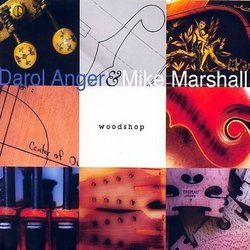Reinventing tradition while keeping the vibe organic and sti
J. Ross | Roseburg, OR USA | 05/08/2007
(5 out of 5 stars)
"Playing Time - 53:28 -- George Harrison once stated, "It doesn't matter if you are the greatest guitar player in the world, if you're not enlightened, forget it." Conceived as a sequel to the monumental 1985 album "Chiaroscuro" (on the Windham Hill label) that sold 65,000 copies in five years, "Woodshop" captures the enlightenment in each and every note, as well as with the silent spaces left between them. "Chiaroscuro" was not their first release together, however. In 1983, they had put out "The Duo" on Rounder Records. And since "Chiaroscuro," Marshall and Anger have collaborated on a 1998 "Christmas Heritage" project and five other fine CDs between 1999-2002 on Alison Brown's Compass Records (New Grange, Anger-Marshall Band JAM, Brand New Can, At Home and on the Range). If you're a musician, there's even a Mel Bay publication ("The Mike Marshall Collection") that includes standard music notation and mandolin tablature for 11 of his compositions (seven drawn from Marshall/Anger albums in the past). Besides proficient musicianship. what's always impressed me about these guys is that everything they've done has creativity, strength, and lasting power. More than just string music on viagra, "Woodshop" is worthy of being heard over and over again to appreciate the nuances of each piece.
The substantive body of Woodshop's 51-minute musical journey is nine instrumental compositions that feature Mike and Darol's violins, mandolins, guitars, mandocello, mandola, and cello. Of particular curiosity is a piece like "Replaceitall" also with Darol's rhythm programming, mystery slap beat, and shakers. It's a "kind of tribute to the Rolling Stones," and the title refers to Keith Richards' 1970s buzz about getting all his blood replaced in Switzerland before going on tour. In a similar vein and arranged with numerous instruments playing the melody in unison, Marshall's "The Creep" has such instruments as bass altered mandocello, hyper-mando, and electro-banjo-creepola. With many other strings in the mix, the folkestra sound is low, eerie and hypnotic. Whether the multi-tracking achieves the sensation of fear, repugnance, and downright creepiness is up to a listener's imagination and perception. As for me, upon initial listens of this disc, I did tend to favor more straightforward compositions that make more traditionally-based and focused statements. These included Hearts Wait, Peter Pan, Slip and Slide, Bach Up, and The Unbearable Gift. Over seven minutes, "Borealis" begins with just mandocello and violin before the song's genesis dynamically takes us into a full sound based on Mike's fantasy of having an entire audience pull out their instruments and jam along while marching towards the stage. Whatever happened to the fantasy of just having teary-eyed teenage girls rushing the stage? In keeping with the need for breathing room and transition, the 51-minute musical journey also has five short (one minute or less) interludes from beginning to end of the CD.
Four of the tracks feature some splendid bass or percussion accompaniment by other consummate musicians. Two cuts (Hearts Wait, The Unbearable Gift) have the inimitable Todd Phillips on bass. It brought back memories of New Grange days in the late-1990s when Mike, Darol and Todd played in that band with Tim O'Brien and Alison Brown. Earlier in Woodshop's set, "Peter Pan" includes Phil Aaberg (piano), Todd Sickafoose (upright bass), and Aaron Johnston (shaker, cymbals). "Who Had Whom?" includes Michael Manring (electric bass) and Aaron Johnston (percussion). All guest artists have highly-acclaimed credentials and reputations as virtuosos. Manring had a long association with Windham Hill Records, and he's a gifted composer of experimental music. Manring's collaboration with Anger and Marshall goes back as far as the early-1980s when all three played in Montreux (with Barbara Higbie and Andy Narell). A San Francisco native, the versatile Todd Sickafoose studied and performed in Los Angeles for six years before returning to the Bay Area in 1999. Montanan Philip Aaberg is a world-class keyboardist and composer who is comfortable in many genres and whose 2002 "Live From Montana" album was nominated for a Grammy. A graduate of Wichita State University's music program, Aaron Johnston is a versatile percussionist who also appeared with Anger & Marshall on their 1999 album, JAM. He currently performs with Brazilian Girls.
Marshall and Anger are now on the new Adventure Music label that wants to build a cadre of top musicians from North and South America who play unadorned, rhythmic and raw acoustic music. It's a good fit, and "Woodshop" illustrates the musicians' continual learning, logical progression and development. Marshall sees glimmers of a new musical style emerging that really incorporates many styles into one global sound. Darol and Mike have always been inspired to break down barriers between genres, and to cross boundaries between songwriting and improvisation. "Woodshop" displays elements of jazz, chamber music, folk, bluegrass and experimental music. Discovery and versatility create a fresh acoustic sound rooted in tradition. Mike and Darol continue to show that tradition can be reinvented to keep the vibe organic and stimulating. (Joe Ross, staff writer, Bluegrass Now)
"
Disappointed
veeschay | southern Utah | 04/04/2008
(2 out of 5 stars)
"I first heard Darol Anger and Mike Marshall from the Montreux albums "Let Them Say" and "Sign Language". I enjoyed those albums and repurchased them recently. That's when I saw the this album, and thought I would try it. Anger and Marshall are excellent musicians, but Woodshop lacked the sense of joy that was on the Montreux works. I will put Woodshop on the shelf and let it sit."


 Track Listings (14) - Disc #1
Track Listings (14) - Disc #1